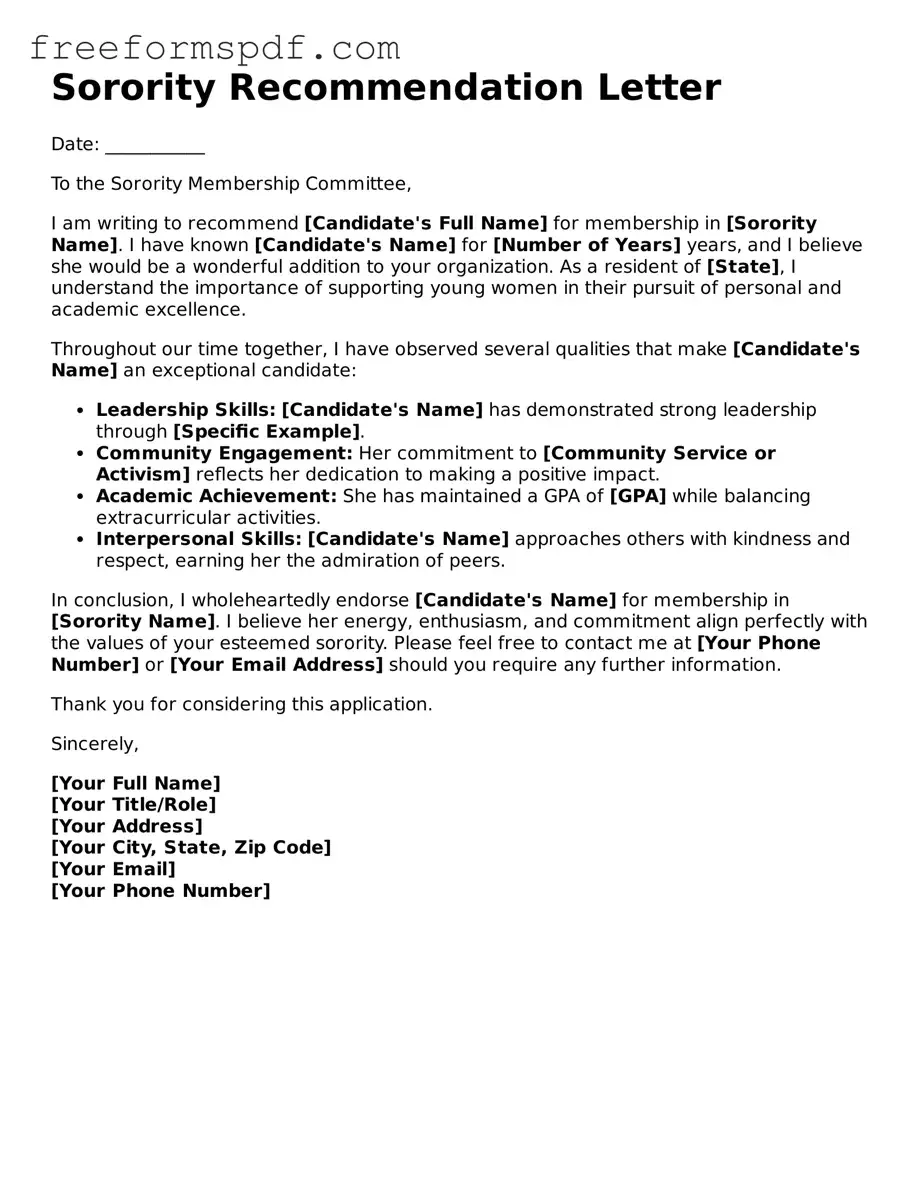Sorority Recommendation Letter Document
Common mistakes
-
Ignoring Instructions: Many individuals overlook the specific guidelines provided for the recommendation letter. Each sorority may have unique requirements, and failing to adhere to these can lead to rejection.
-
Incomplete Information: Some people forget to fill out all the required fields. Leaving sections blank can raise red flags for the sorority, as it may appear that the recommender is not fully invested in the candidate.
-
Using Generic Language: A common mistake is writing a recommendation that lacks personalization. Generic phrases do not showcase the candidate's unique qualities, making it harder for the sorority to see why they would be a great fit.
-
Neglecting to Proofread: Spelling and grammatical errors can undermine the credibility of the recommendation. Taking the time to review the letter ensures clarity and professionalism.
-
Focusing Too Much on Academics: While academic achievements are important, a well-rounded recommendation should also highlight personal qualities, leadership skills, and community involvement.
-
Not Including Specific Examples: Recommendations that lack specific anecdotes or examples fail to paint a vivid picture of the candidate. Including stories can make the letter more engaging and memorable.
-
Submitting Late: Timeliness is crucial. Late submissions can reflect poorly on both the recommender and the candidate, potentially jeopardizing their chances of acceptance.
-
Choosing the Wrong Recommender: Not all recommendations carry the same weight. Selecting someone who knows the candidate well and can speak to their strengths is essential for a compelling letter.
-
Forgetting to Follow Up: After submitting the recommendation, it’s helpful to check in with the candidate. This shows support and ensures that everything was received correctly.
Learn More on This Form
-
What is a Sorority Recommendation Letter?
A Sorority Recommendation Letter is a document written by a member of a sorority to support a potential new member during the recruitment process. This letter provides insight into the candidate's character, achievements, and suitability for membership. It helps sorority chapters evaluate prospective members and can significantly enhance a candidate's chances of being invited to join a sorority.
-
Who should write the Recommendation Letter?
Typically, the letter should be written by an alumna of the sorority to which the candidate is applying. However, it can also be written by other individuals who know the candidate well, such as teachers, coaches, or family friends. The writer should be able to provide a personal perspective on the candidate's qualities, values, and potential contributions to the sorority.
-
What information should be included in the letter?
The letter should include the following information:
- The writer's relationship with the candidate and how long they have known each other.
- Specific examples of the candidate's leadership skills, academic achievements, and involvement in extracurricular activities.
- Personal qualities that make the candidate a good fit for the sorority, such as kindness, dedication, and teamwork.
- Any relevant anecdotes that highlight the candidate's character and values.
-
How is the Recommendation Letter submitted?
The submission process for the Recommendation Letter can vary by sorority. Generally, the letter can be submitted electronically or by mail. It is important to check the specific requirements of the sorority in question. Some may require the letter to be submitted by a certain deadline, so it is advisable to plan ahead to ensure timely submission.
-
Is a Recommendation Letter required for joining a sorority?
While a Recommendation Letter is not always required, it is highly recommended. Many sororities have a competitive recruitment process, and a strong recommendation can provide a significant advantage. If a candidate does not have a letter, they may still be able to participate in recruitment, but having one can enhance their chances of being noticed and invited to join.
Misconceptions
When it comes to sorority recruitment, the Sorority Recommendation Letter form often sparks confusion. Here are four common misconceptions about this important document.
- Misconception 1: A recommendation letter is mandatory for all sororities.
- Misconception 2: The recommendation letter guarantees membership.
- Misconception 3: Anyone can write a recommendation letter.
- Misconception 4: The content of the letter is unimportant.
While many sororities encourage or prefer recommendation letters, not all require them. Some chapters may accept potential new members without a letter, especially if they have a strong connection to the sorority or come highly recommended by a member.
Receiving a recommendation letter does not ensure that a potential member will be offered a bid. The letter serves as a supportive endorsement, but the final decision rests with the sorority's membership selection process.
While friends and family may provide valuable insights, most sororities prefer letters from alumnae members of the organization. These individuals can offer a more informed perspective on the potential member’s character and fit within the sorority.
The details in a recommendation letter matter significantly. A well-crafted letter that highlights the potential member’s strengths, achievements, and personal qualities can make a positive impression. Conversely, vague or generic letters may not carry the same weight.
Other Types of Sorority Recommendation Letter Forms:
Sample Letter of Good Moral Character for Immigration - Confirms the individual's good moral standing.
Eagle Scout Reference Letter - He/she is able to articulate ideas clearly to diverse audiences.
For those seeking guidance in navigating custody matters, a well-crafted character reference letter for child custody considerations can be invaluable. This letter serves as a powerful testament to the parent’s capabilities and character, offering insights that may influence the court's decision positively.
Letters of Support for Immigration - It’s helpful for the letter to address any previous relationships to clarify current intentions.
